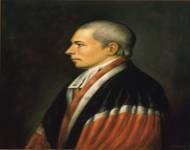
William Paterson (1793-1806) was heavily involved with the New Jersey government during the Revolutionary War and served as governor of the state before being nominated by President George Washington to serve as an Associate Justice to the United States Supreme Court.
Early Life
William Patterson was born on December 24, 1745, in County Antrim, Ireland. Paterson immigrated to America with his family when he was two years old, first living in Delaware and later settling in Princeton, New Jersey. He entered the College of New Jersey (now Princeton University) at the age of fourteen, earning his B.A. and M.A. in 1763 and 1766, respectively. Following graduation Paterson studied law under prominent New Jersey lawyer Richard Stockton, and he was admitted to the bar in 1768.
Early Career
During the Revolutionary War, Paterson was heavily involved with the New Jersey state government. He acted as delegate to the state’s first three provincial congresses, where he recorded the New Jersey State Constitution as secretary in 1776. From 1776 to 1783 Paterson gained renown for serving as Attorney General of the state of New Jersey.
In 1787 Paterson was chosen to represent New Jersey at the Constitutional Convention in Philadelphia. As a New Jersey delegate, Paterson promoted the New Jersey Plan (also known as the Paterson Plan), which asserted the rights of smaller states.
Paterson was elected to the United States Senate in 1789, where he went on to play a large role in establishing the federal court system with the passing of the Judiciary Act of 1789. After serving only one year as a U.S. Senator, Paterson became Governor of New Jersey in 1790. During his time as Governor, Paterson worked to reorganize the legal system of the state.
Supreme Court
In 1793, only three years after being elected New Jersey Governor, Paterson was nominated by President Washington to serve as Justice of the United States Supreme Court. Paterson took the seat of Justice Thomas Johnson after his resignation, and Paterson officially began his post on March 4, 1793.
Though the caseload was light in the early years of the Supreme Court, Justice Paterson presided over several important cases. Most notable of these cases was Marbury v. Madison (1803), which now stands as a landmark case in United States law. Justice Paterson joined Chief Justice John Marshall in the opinion that the Judiciary Act of 1789 was unconstitutional. This ruling went on to create the basis for judicial review and helped define the separation of powers based on the American Constitution.
Other notable cases during Paterson’s tenure on the Supreme Court include VanHorne’s Lessee v. Dorrance (1795), Hylton v. United States (1796) and Calder v. Bull (1798). In VanHorne’s Lessee v. Dorrance, Justice Paterson ruled that a Pennsylvania state law was in violation of the state constitution. In Hylton v. United States, Paterson stated that the carriage tax was an excise tax and not a direct tax. Although they refrained from overruling the statute, this became the first case that questioned constitutionality of an act of Congress. In Calder v. Bull, Paterson joined the unanimous decision that the ex post facto clause applies to criminal, not civil cases.







